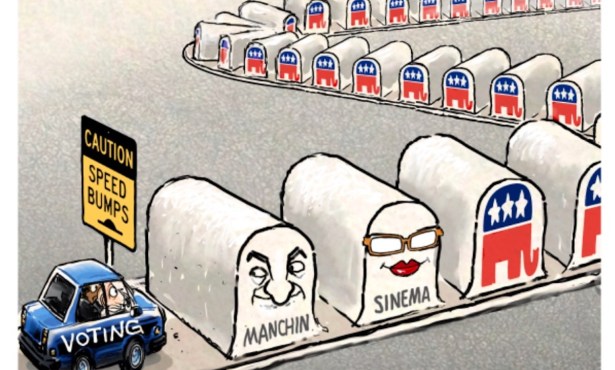Our Last Best Chance to Stop Global Warming
The Democratic Infrastructure Bills and the Glasgow Climate Summit

If you’re confused about the two infrastructure bills now pending in the Congress, you’re not alone. Together they address everything from updating roads, bridges, railroads, and airports to cleaning up Superfund sites; pre-kindergarten expansion; lowering the price of prescription drugs; tax cuts for the elderly; investments in small businesses and ensuring the wealthy and corporations pay their fair share of taxes. While these are all good things, which should be done, there is one existential aspect of the bills which, should the fail, we predictably will not recover from-climate change.
President Biden, at his Earth Day Summit earlier this year, committed to cutting our greenhouse gas (GHG) emissions by 50 to 52 percent, relative to 2005 levels by 2030, a goal agreed to but not yet acted upon by the nations of the world. All of the measures to achieve his goal are in the two bills.
The “traditional” $1 trillion bipartisan (Infrastructure Investment and Jobs Act), which passed the Senate (69-30, including 19 Republicans) and is now in the House, would provide: updating the electrical grid to ensure transmission of green energy; expanding nationwide electric vehicle charging stations; converting bus fleets to electric and zero-emission buses; and expanding public transportation for buses and trains. These are necessary. They will not suffice to reach the President’s GHG reduction goals.
Biden’s Build Back Better $3.5 trillion infrastructure bill, passed by the House but stuck in the Senate, hit the mark. It includes incentives and payments for electricity suppliers to increase the amount of clean electricity they produce; more funding for low-income solar and wind technologies; clean energy tax incentives; electrifying the federal vehicle fleet; rehabbing federal buildings with energy saving measures; investing in green materials procurement; ensuring climate change research; and promoting healthy oceans to ensure they can continue their carbon absorbing functions. If you put the two bills together we could reach Biden’s 50 percent reduction by 2030.
The urgency for doing this cannot be overstated. In an unprecedented warning, on September 7, more than 200 medical journals warned that climate change is now the “greatest threat” to global public health.” The joint publication urged world leaders to reduce heat-trapping emissions, and cautioned that the world cannot wait for the COVID-19 pandemic to pass before addressing climate change.
On August 10, UN scientists issued a global warming “code red for humanity” warning: “It’s guaranteed that it’s going to get worse, nowhere to run, nowhere to hide.” The emergency these scientists are warning us about is here. The wildfires, hurricanes, flooding, and droughts we are now experiencing are the new normal. As long as we keep pumping greenhouse gases into the atmosphere, they will only intensify, as the scientists say.
Beginning October 31, through November 12, world leaders will meet in Glasgow, Scotland, to address commitments to cutting fossil fuels, reducing air pollution, and improving health worldwide. This could be the world’s last best chance to avoid the coming tipping point (an additional 1.5 degrees Celsius, 2.7 degrees Fahrenheit of warming) and a global climate disaster, predictably beginning in the 2030s without intervention. If we reach the tipping point Nature’s life-giving ecosystems which provide our food, water, and air will begin to disintegrate.
If the U.S. is to have any leadership credibility in Glasgow, we must pass the infrastructure bills; otherwise we are all talk and no action. After four years of the Trump administration denying climate change, we have to prove we are serious and capable of a leadership role. We are second in emitting GHGs. China is first, India third, and Russia fourth. None of them will lead on this issue. The EU does not have the political authority to do so. If we don’t accept the leadership mantel, more global warming and world-wide lethal climate disasters will occur.
Ironically, it’s not the filibuster threatening this action but two Democratic senators: Joe Manchin (D-WVA) and to a lesser degree Krysten Sinema (D-AZ). Biden’s Build Back Better bill can be passed through the budget reconciliation process by a majority vote, thereby avoiding the 60 votes needed to overcome a Republican filibuster. Manchin and Sinema say the bill is too expensive. I believe that Sinema’s objection can be overcome. Manchin, because of his investment in coal businesses, is a very different matter.
Senator Manchin not only represents a coal-producing state, he for decades has profited from coal companies he founded in the 1980s (more than $4.5 million since he joined the senate). What is chilling, however, are his comments on climate: “If your sticking your head in the sand, and saying that fossil [fuel] has to eliminated in America … and thinking that’s going to clean up the global climate, it won’t … If anything it would be worse.” The relationship between global warming and fossil fuels is well past this kind of 20th-century denial. The relationship is absolute and must be stopped.
In a 50-50 Senate, Senator Manchin can prevent the legislation from becoming law thereby destroying U.S. credibility in Glasgow. We should, in a loud and clear voice, point out his self-interest and obstruction, and condemn it. You don’t have to be a constituent to contact him. Call his office (202- 224-3121), email him (www.senate.gov), or send him a letter (306 Hart Senate Office Building, Washington, D.C. 20510).



